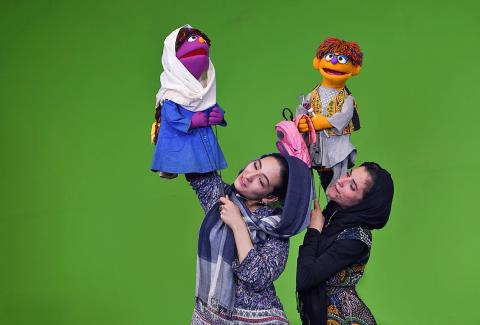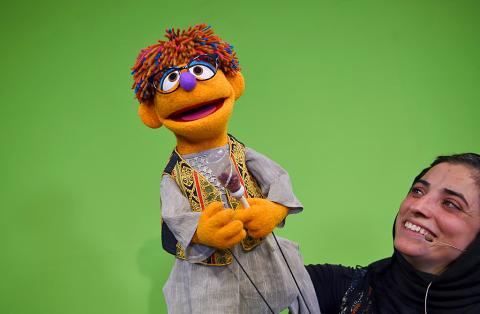Zeerak the bespectacled orange muppet is the latest innovation from Sesame Street in Afghanistan: a children’s TV character who reveres his educated older sister, brought on to screens to show a new generation that a woman’s place is beyond the home. Producers are betting the new character — a four-year-old boy dressed in a traditional shalwar kameez and a waistcoast embroidered in Afghan national colors will inspire millions of children — and their parents — to see the value in education. Zeerak’s big sister Zari, introduced last year with great fanfare as the first Afghan muppet to join internationally cherished characters such as Big Bird and Elmo, has already proved a success on the local version of Sesame Street, known as ‘Baghch-e-Simsim’.
Massood Sanjer, head of Tolo TV which airs the show, believes introducing a boy, who adores and wants to emulate his school-going, older sibling, will “indirectly teach the kids to love their sisters” in a conservative, gender-segregated nation which traditionally has invested more in its sons.
Baghch-e-Simsim is the only program on Afghan television dedicated to children and has a remarkable reach — a recent survey showed some 80 percent of children and parents with access to television watch the show. Sanjer believes the show can, from an early age, underline the importance of educated women in Afghan society, but also show boys that a good education benefits everyone.

Photo: AFP / WAKIL KOHSAR
“Kids and parents who have access to TV are watching and know the brand of the character. So it is a very good sign that people love to learn and it is great to use media as an education tool for kids,” he said.
That message still needs to be hammered home in many parts of Afghanistan nearly 16 years after the end of the Taliban’s repressive regime. A report published last year by the National Risk and Vulnerability Assessment Center showed that just 66 percent of boys and 37 percent of girls aged 15 to 24 can read and write, while barely 45.5 percent of Afghans attend primary school, and 27 percent secondary school.
DRIVING SOCIAL CHANGE

Photo: AFP / WAKIL KOHSAR
The broadcaster is utilizing everything it can to help change attitudes — the new muppet Zeerak’s name means ‘smart’ in Dari and Pashto, Afghanistan’s two official languages. And even his trendy, black-rimmed glasses were chosen for a reason.
Producer Wajiha Saidy says that wearing spectacles is seen as shameful for Afghan youngsters, so they wanted to address the issue and show it to be normal.
Across its global iterations, Sesame Street has made a point of inclusivity with its cast. Earlier this year the American version debuted a character with autism, while in South Africa the program features a HIV-positive muppet.

Photo: AFP / WAKIL KOHSAR
Last week it courted controversy in the US after tweeting a group image of some of its stars to reflect a rainbow in support of LGBT Pride Month.
“Sesame Street is proud to support families of all shapes, sizes and colors,” the official account said.
In Afghanistan, the show’s attention to equality extends to its casting, with two talented female puppeteers, Sima and Mansour, lending their voices to Zari and Zeerak.
Zari is by far the favorite character on the show in Afghanistan, according to the study commissioned by Tolo which surveyed some 1,500 children and their parents.
Just 60 percent of Afghanistan has access to television, but Baghch-e-Simsim is also broadcast on the radio across 44 FM stations, says Anwar Jamilli, who runs the audio progams.
The producers also organize small mobile theaters that travel to kindergartens in rural areas, with Jamilli estimating that they reached nearly 20,000 children last year. He says the show’s focus on friendship and sharing brings a dose of happiness to children living with the ever-present threat of violence.
“This is very new for Afghan children”, he says.

June 9 to June 15 A photo of two men riding trendy high-wheel Penny-Farthing bicycles past a Qing Dynasty gate aptly captures the essence of Taipei in 1897 — a newly colonized city on the cusp of great change. The Japanese began making significant modifications to the cityscape in 1899, tearing down Qing-era structures, widening boulevards and installing Western-style infrastructure and buildings. The photographer, Minosuke Imamura, only spent a year in Taiwan as a cartographer for the governor-general’s office, but he left behind a treasure trove of 130 images showing life at the onset of Japanese rule, spanning July 1897 to

One of the most important gripes that Taiwanese have about the Democratic Progressive Party (DPP) is that it has failed to deliver concretely on higher wages, housing prices and other bread-and-butter issues. The parallel complaint is that the DPP cares only about glamor issues, such as removing markers of Chinese Nationalist Party (KMT) colonialism by renaming them, or what the KMT codes as “de-Sinification.” Once again, as a critical election looms, the DPP is presenting evidence for that charge. The KMT was quick to jump on the recent proposal of the Ministry of the Interior (MOI) to rename roads that symbolize

On the evening of June 1, Control Yuan Secretary-General Lee Chun-yi (李俊俋) apologized and resigned in disgrace. His crime was instructing his driver to use a Control Yuan vehicle to transport his dog to a pet grooming salon. The Control Yuan is the government branch that investigates, audits and impeaches government officials for, among other things, misuse of government funds, so his misuse of a government vehicle was highly inappropriate. If this story were told to anyone living in the golden era of swaggering gangsters, flashy nouveau riche businessmen, and corrupt “black gold” politics of the 1980s and 1990s, they would have laughed.

In an interview posted online by United Daily News (UDN) on May 26, current Chinese Nationalist Party (KMT) Chairman Eric Chu (朱立倫) was asked about Taichung Mayor Lu Shiow-yen (盧秀燕) replacing him as party chair. Though not yet officially running, by the customs of Taiwan politics, Lu has been signalling she is both running for party chair and to be the party’s 2028 presidential candidate. She told an international media outlet that she was considering a run. She also gave a speech in Keelung on national priorities and foreign affairs. For details, see the May 23 edition of this column,